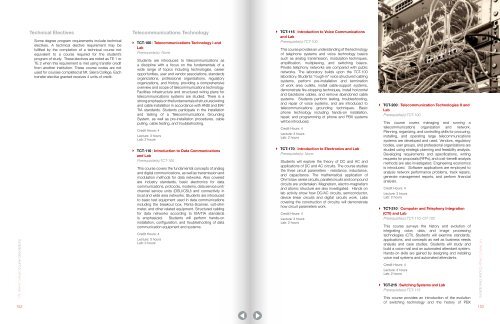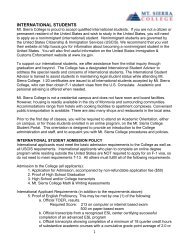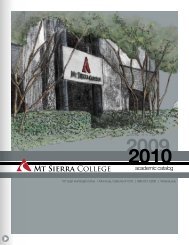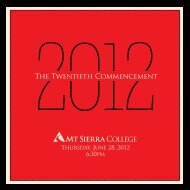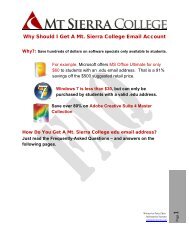academic catalog - Mt. Sierra College
academic catalog - Mt. Sierra College
academic catalog - Mt. Sierra College
You also want an ePaper? Increase the reach of your titles
YUMPU automatically turns print PDFs into web optimized ePapers that Google loves.
<strong>Mt</strong>. <strong>Sierra</strong> <strong>College</strong> Course Descriptions<br />
152<br />
Technical Electives<br />
Some degree program requirements include technical<br />
electives. A technical elective requirement may be<br />
fulfilled by the completion of a technical course not<br />
equivalent to a course required for the student’s<br />
program of study. These electives are noted as TE 1 or<br />
TE 2 when this requirement is met using transfer credit<br />
from another institution. These course codes are not<br />
used for courses completed at <strong>Mt</strong>. <strong>Sierra</strong> <strong>College</strong>. Each<br />
transfer elective granted receives 4 units of credit.<br />
Telecommunications Technology<br />
` TCT-100 | Telecommunications Technology I and<br />
Lab<br />
Prerequisite(s): None<br />
Students are introduced to telecommunications as<br />
a discipline with a focus on the fundamentals of a<br />
wide range of topics including technologies, career<br />
opportunities, user and vendor associations, standards<br />
organizations, professional organizations, regulatory<br />
organizations, and history, providing a comprehensive<br />
overview and scope of telecommunications technology.<br />
Facilities infrastructure and structured wiring plans for<br />
telecommunications systems are studied. There is a<br />
strong emphasis on the fundamentals of structured wiring<br />
and cable installation in accordance with ANSI and EIA/<br />
TIA standards. Students participate in the installation<br />
and testing of a Telecommunications Grounding<br />
System, as well as pre-installation procedures, cable<br />
pulling, cable testing, and troubleshooting.<br />
Credit Hours: 4<br />
Lecture: 3 hours<br />
Lab: 2 hours<br />
` TCT-110 | Introduction to Data Communications<br />
and Lab<br />
Prerequisite(s):TCT-100<br />
This course covers the fundamental concepts of analog<br />
and digital communications, as well as transmission and<br />
modulation methods for data networks. Also covered<br />
are industry standards, basic electronics for data<br />
communications, protocols, modems, data service unit/<br />
channel service units (DSU/CSU) and connectivity in<br />
local and wide area networks. Students are introduced<br />
to basic test equipment used in data communications<br />
including the breakout box, Penta-Scanner, volt-ohm<br />
meter, and other related equipment. Structured cabling<br />
for data networks according to EIA/TIA standards<br />
is emphasized. Students will perform hands-on<br />
installation, configuration, and troubleshooting of data<br />
communication equipment and systems.<br />
Credit Hours: 4<br />
Lecture: 3 hours<br />
Lab: 2 hours<br />
` TCT-115 | Introduction to Voice Communications<br />
and Lab<br />
Prerequisite(s):TCT-100<br />
This course provides an understanding of the technology<br />
of telephone systems and voice technology basics<br />
such as analog transmission, modulation techniques,<br />
amplification, multiplexing, and switching basics.<br />
Private telephony networks are compared with public<br />
networks. The laboratory builds upon the TCT-100<br />
laboratory. Students “rough-in” voice structured cabling<br />
systems, perform pre-installation and termination<br />
of work area outlets, install cable-support systems,<br />
demonstrate fire-stopping techniques, install horizontal<br />
and backbone cables, and remove abandoned cable<br />
systems. Students perform testing, troubleshooting,<br />
and repair of voice systems, and are introduced to<br />
telecommunications grounding techniques. Basic<br />
phone technology including hands-on installation,<br />
repair, and programming of phone and PBX systems<br />
will be introduced.<br />
Credit Hours: 4<br />
Lecture: 3 hours<br />
Lab: 2 hours<br />
` TCT-170 | Introduction to Electronics and Lab<br />
Prerequisite(s): None<br />
Students will explore the theory of DC and AC and<br />
applications of DC and AC circuits. The course studies<br />
the three circuit parameters - resistance, inductance,<br />
and capacitance. The mathematical application of<br />
Ohm’s law, series circuits, parallel circuits and compound<br />
circuits are undertaken. Magnetism, electro-magnetism<br />
and atomic structure are also investigated. Hands on<br />
lab activity show how DC/AC circuits, semiconductor,<br />
device linear circuits and digital circuits work. Labs<br />
covering the construction of circuitry will demonstrate<br />
how circuit parameters work.<br />
Credit Hours: 4<br />
Lecture: 3 hours<br />
Lab: 2 hours<br />
` TCT-200 | Telecommunication Technologies II and<br />
Lab<br />
Prerequisite(s):TCT-100<br />
This course covers managing and running a<br />
telecommunications organization and network.<br />
Planning, organizing, and controlling skills for procuring,<br />
installing, and operating large telecommunications<br />
systems are developed and used. Vendors, regulatory<br />
bodies, user groups, and professional organizations are<br />
studied using strategic planning and feasibility analysis.<br />
Developing requirements and specifications, writing<br />
requests for proposals (RFPs), and cost-benefit analysis<br />
methods are also investigated. Engineering economics<br />
is introduced. Software applications are employed to<br />
analyze network performance problems, track repairs,<br />
generate management reports, and perform financial<br />
analysis.<br />
Credit Hours: 4<br />
Lecture: 3 hours<br />
Lab: 2 hours<br />
` TCT-210 | Computer and Telephony Integration<br />
(CTI) and Lab<br />
Prerequisite(s):TCT-110; CIT-102<br />
This course surveys the history and evolution of<br />
integrating voice, data, and image processing<br />
technologies (CTI). Students will examine standards,<br />
applications, and concepts as well as business needs<br />
analysis and case studies. Students will study and<br />
build a voice mail and an automated attendant system.<br />
Hands-on skills are gained by designing and installing<br />
voice mail systems and automated attendants.<br />
Credit Hours: 4<br />
Lecture: 3 hours<br />
Lab: 2 hours<br />
` TCT-215 | Switching Systems and Lab<br />
Prerequisite(s):TCT-115<br />
This course provides an introduction of the evolution<br />
of switching technology and the history of PBX<br />
<strong>Mt</strong>. <strong>Sierra</strong> <strong>College</strong> Course Descriptions<br />
153


